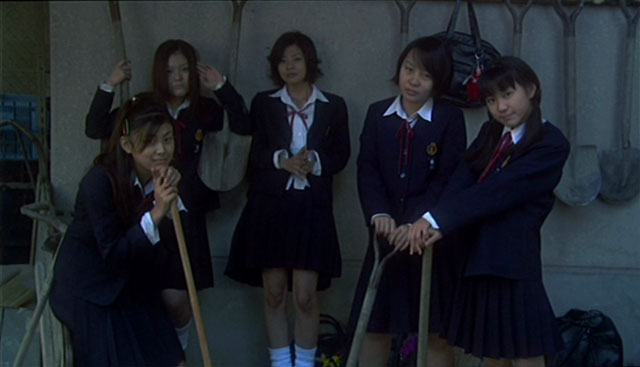
This band centred on Katsuro Kayama ( 加山葛比路, Kayama Katsuro), who wrote the music for the band. Lily Chou-Chou was originally the vocalist of the band Philia ( フィリア, Firia), that formed broke up two years after their debut in 1995. Lily Chou-Chou is portrayed as being extremely successful, with her CDs lining prominent displays in music stores such as Tsutaya. The BBS on this website is a crucial feature to the plot of the film. She has an official website, Lilyholic, which features as a back-story to the film, including news articles and a discography. She was born on December 8, 1980, at 10:50pm, a fact that fans in the film link to the same time of the murder of Beatles' member John Lennon. Lily Chou-Chou is portrayed as the stage name of a solo musician, Keiko Suzuki ( 鈴木圭子, Suzuki Keiko). The group plan to perform a live at the Nakano Sun Plaza Hall on December 15. The music video for the song was exclusively debuted at MTV Japan on December 1.


The group released a digital single, "Ether," on December 8, 2010. On her 2009 tour for Merkmal, she performed "Erotic," "Glide," "Hikōsen," "Kaifuku Suru Kizu," "Sight" and "Tobenai Tsubasa." įor the film's 10th anniversary in 2010, the band reformed as a three-member band featuring guitarist Yukio Nagoshi, however without the direct involvement of Iwai. Some of Salyu's most notable songs have been composed by him, such as " Atarashii Yes," " Corteo (Gyōretsu)," " Platform," " To U" and "Valon." Salyu included the Lily Chou-Chou songs "Hōwa" and "Glide" on her 2008 greatest hits album Merkmal. She began working with Kobayashi as her producer since her debut, and continues to work with him. Salyu debuted as a musician in 2004 with the single " Valon," a collaboration with hip-hop musician Ilmari. In 2003, the Lily Chou-Chou song "Kaifuku Suru Kizu" was featured in the Quentin Tarantino film Kill Bill Vol. The group released their album, Kokyū, in October 2001, a week and a half after the release of the film in Japan.Īfter the release of the film, the group ceased to release music. Three Iwai-directed music videos were produced for the project, "Glide," "Kyōmei (Kūkyo na Ishi)" and "Tobenai Tsubasa." Salyu performed "Kyōmei (Kūkyo na Ishi)" on music shows Hey! Hey! Hey! Music Champ and Music Station in June 2000. In April 2000, Lily Chou-Chou music began to be released, with the single "Glide" and later "Kyōmei (Kūkyo na Ishi)" in June. Iwai supplied the lyrics of two songs to the project, "Arabesque" and "Tobenai Tsubasa." The music was produced as a collaboration between Iwai, Salyu, a musician who had not debuted yet, and Takeshi Kobayashi, a music producer who had previously worked with Iwai on the soundtrack to his 1996 film Swallowtail Butterfly. ( J.Lily Chou-Chou as a character was initially created by Shunji Iwai in 2000, as a part of an online novel that was posted on a BBS.

Still, while not an 'easy' film in the conventional sense, those viewers who manage to get on its wavelength may find it intriguing. The first Japanese film shot entirely on digital video, All About Lily Chou-Chou's muted colors and slow, hypnotic style will either draw viewers into a state of attentive alertness or bore them to tears.
All about lily chou chou length series#
In due course, however, the film escalates into a desperate, seemingly inescapable series of disturbing developments involving teenage prostitution, petty theft, wanton violence, and perhaps even murder (in a mysterious twist), expanding on its origins as a real-life Internet novel that writer-director Shunji Iwai then adapted into a screenplay.

Adolescent loneliness and school-bully brutality are treated with frank, sometimes shocking realism in the Japanese film All About Lily Chou-Chou, in which a reclusive eighth-grader named Yuichi escapes from his unpleasant school-life by serving as the online moderator of an Internet chat room devoted to Lily Chou-Chou, a Björk-like chanteuse whose music provides a sanctuary from Yuichi's real-world anxieties.


 0 kommentar(er)
0 kommentar(er)
